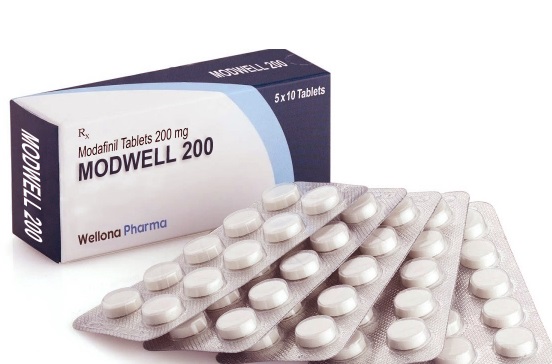Nikhil Prasad Fact checked by:Thailand Medical News Team Jan 21, 2025 1 year, 2 weeks, 2 days, 21 hours, 57 minutes ago
Medical News: The use of prescription stimulants for non-medical purposes, often referred to as "smart drugs," has surged globally, raising important questions about their safety, regulation, and long-term effects. A recent study conducted by Polish researchers from the University of Opole, Wroclaw Medical University, and the Wroclaw University of Science and Technology, in collaboration with the Institute of Toxicology Research in Poland, has delved into the use of modafinil, a popular cognitive enhancer, analyzing its biological and toxicological implications. The findings provide valuable insights into the composition of these drugs and their potential risks.
 The Growing Concern Around Smart Drugs Such as Modafinil
What Are Smart Drugs?
The Growing Concern Around Smart Drugs Such as Modafinil
What Are Smart Drugs?
Smart drugs are substances believed to enhance cognitive abilities such as memory, attention, and alertness. Among these, modafinil has gained significant attention. Originally developed to treat narcolepsy and other sleep disorders, it is now widely misused by students, professionals, and even healthcare workers seeking to improve productivity or combat fatigue. However, this growing trend has sparked debates about the misuse of pharmaceuticals and their long-term consequences on health.
This
Medical News report focuses on the detailed findings from a study that highlights the prevalence, misuse, and chemical inconsistencies of modafinil available on the black market. These inconsistencies pose significant risks to users who rely on such products for their cognitive or physical enhancement.
Study Overview
The researchers employed a state-of-the-art method - ultra-high-performance liquid chromatography coupled with triple quadrupole tandem mass spectrometry (UHPLC-QqQ-MS/MS) - to analyze both evidentiary samples of modafinil purchased online and biological specimens from real-world cases. Five different products, marketed under names like "Waklert," "Modalert," and "Modvigil," were scrutinized for their composition and concentration of active ingredients.
The samples revealed startling discrepancies between the labeled and actual dosages. The modafinil content ranged from 45.5% to 80.5% of the doses claimed on the packaging. Such significant variances highlight the dangers of purchasing unregulated pharmaceuticals, which may not meet quality control standards.
Key Findings
-Discrepancies in Drug Composition
The analysis found that the actual modafinil content in black-market products was far below the advertised dose. For instance, a product labeled to contain 200 mg of modafinil was found to have as little as 90.7 mg in some cases. This inconsistency raises concerns about the reliability and safety of these drugs.
-Presence of Sodium Adducts
During high-concentration testing, researchers observed sodium adducts, such as [M + Na]+ and dimer [2M + Na]+. While these adducts were not harmful, their detection underlines the variability
in drug formulation techniques.
-Biological Analysis
Biological samples from three post-mortem cases revealed modafinil concentrations ranging from 110 ng/mL in blood to over 1000 ng/mL in putrefaction fluid. These findings emphasize the need for routine toxicological monitoring of smart drugs in forensic investigations. In one case, modafinil was detected alongside other substances like THC, ketamine, and benzodiazepines, further complicating the interpretation of its effects.
Validated Testing Methodology
The UHPLC-QqQ-MS/MS method proved to be highly accurate and reliable for detecting modafinil in both pharmaceutical and biological samples. It demonstrated excellent precision, with validation data showing recovery rates exceeding 110% and low limits of detection (0.05 μg/mL for evidentiary samples and 1.0 ng/mL for blood).
Implications for Public Health
The findings reveal the widespread availability of counterfeit or substandard modafinil products on the black market. Users seeking cognitive enhancement are often unaware of the potential risks posed by these poorly regulated drugs. The study highlights the following concerns:
-Health Risks: Misuse of modafinil can lead to side effects such as anxiety, irritability, insomnia, and, in rare cases, psychotic symptoms or addiction. The risks are amplified when the drug's actual composition deviates from its labeled dosage.
-Addiction Potential: Although modafinil is considered less addictive than traditional stimulants, cases of dependence have been reported, particularly among individuals with pre-existing psychiatric disorders.
-Forensic Challenges: Detecting modafinil in toxicological investigations is critical but often overlooked. The study calls for the inclusion of smart drugs in routine forensic screenings to better understand their role in accidental overdoses or substance abuse cases.
Conclusions
This research underscores the need for stricter regulations and quality control measures for cognitive enhancers like modafinil. The study’s detailed toxicological analysis revealed significant discrepancies in the composition of black-market modafinil, posing serious risks to public health. Additionally, the inclusion of modafinil in routine forensic screenings is vital to understanding its impact on both clinical and non-clinical scenarios.
To ensure user safety, authorities must prioritize the regulation of online pharmaceutical sales, while healthcare providers should educate the public about the risks of self-medicating with smart drugs. Future research should focus on the long-term effects of modafinil use in healthy individuals and its potential interactions with other substances.
The study findings were published in the peer-reviewed journal: Journal of Xenobiotics.
https://www.mdpi.com/2039-4713/15/1/15
For the latest on Smart Drugs, keep on logging to Thailand
Medical News.
Read Also:
https://www.thailandmedical.news/news/new-u-s-fda-warning-for-weight-loss-drugs-ozempic-and-wegovy
https://www.thailandmedical.news/news/exploring-drug-induced-myocardial-infarction
https://www.thailandmedical.news/news/drug-induced-myoclonus-a-comprehensive-review
https://www.thailandmedical.news/articles/med-news
